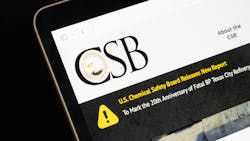Chemical Industry Pushes Back on Trump Plan to Axe Safety Watchdog
Chemical plant operators may have to rely on their due diligence to prevent safety disasters if the Trump administration’s plan to eliminate the U.S. Chemical Safety and Hazard Investigation Board (CSB) goes into effect.
President Trump has proposed slashing the independent safety agency by October 2026, according to budget documents released last week.
In the 1,226-page Office of Management and Budget report, the administration “proposes to eliminate funding for several independent agencies, including the Chemical Safety and Hazard Investigation Board, as part of the Administration's plans to move the Nation towards fiscal responsibility and to redefine the proper role of the Federal Government.”
Several industry professionals and one of the nation’s leading safety voices cautioned that shuttering the CSB would leave chemical operators without a key tool for minimizing hazards in their facilities.
“CSB is a very small organization,” said Jordan Barab, former deputy assistant secretary of labor for the Occupational Safety and Health Administration (OSHA) under President Barack Obama. “It has a budget of about $14 million, which is not even a tiny spec in the federal government. And for what it produces for that small amount of money is enormously important for the entire U.S. chemical industry.”
Barab added that CSB plays a critical role in informing regulatory agencies, like OSHA and the Environmental Protection Agency, about how to improve their standards.
CSB is an independent agency that does not enforce chemical plant safety but investigates incidents and provides recommendations on how plants can prevent future accidents.
“Something that the CSB can do, which OSHA can't, is investigate things like human factors — how many hours are workers working; how exhausted are they; how well trained are they?” Barab said.
CSB, known industrywide for its professionally produced reenactment videos, examines root causes of the incident, including procedural documents and organizational factors, such as management changes or budget cuts to safety programs, Barab added.
Edward Speyer, a chemical engineer at William T. Burnett & Co., which produces technical foams, wrote a LinkedIn article, voicing his concerns about potential industry impacts from Trump's proposal to eliminate the CSB. In a follow-up email to Chemical Processing, Speyer said CSB’s reports are powerful tools for learning safety best practices at all levels within a chemical operation.
“I have found in my career that most companies keep these incidents in-house as much as they can for a variety of reasons, or at a minimum, they will share them across business functions within the same company,” he stated. “For me, the USCSB has expanded my access to dozens of other unique incident reports from across the country. They help me anticipate new hazard scenarios that I hadn’t considered before because that technology might not yet be applicable at my place of work.”
He further stated that watching the animated videos and renderings of the incidents has made him a better engineer.
“One could argue that investing in the USCSB is also an investment in me and many others who learn from these investigations,” he said. “We are now less likely to make the same mistakes, which in turn reduces the possibility of accidents that would otherwise cause harm to people, the environment and infrastructure, not to mention the disruptions to American supply chains and loss of revenue for American businesses.”
Industry groups, including the American Chemistry Council (ACC), have also stated the importance CSB plays in ensuring safety across the sector.
“The President’s proposal is one step in the budget process, and we appreciate his efforts to ensure taxpayer dollars are being used wisely. Congress tasked the U.S. Chemical Safety and Hazard Investigation Board (CSB) with the important role of helping to advance safety by investigating chemical accidents. The reports and recommendations that the CSB produces have served as a valuable resource for industry stakeholders,” ACC stated.
The industry group added that it plans to work with the president and Congress to help them understand it support CSB as they consider the proposed budget.
CSB has been operating since 1998 under the Clean Air Act Amendments of 1990 and has issued more than 1,000 recommendations since its inception.
About the Author
Jonathan Katz
Executive Editor
Jonathan Katz, executive editor, brings nearly two decades of experience as a B2B journalist to Chemical Processing magazine. He has expertise on a wide range of industrial topics. Jon previously served as the managing editor for IndustryWeek magazine and, most recently, as a freelance writer specializing in content marketing for the manufacturing sector.
His knowledge areas include industrial safety, environmental compliance/sustainability, lean manufacturing/continuous improvement, Industry 4.0/automation and many other topics of interest to the Chemical Processing audience.
When he’s not working, Jon enjoys fishing, hiking and music, including a small but growing vinyl collection.
Jon resides in the Cleveland, Ohio, area.

